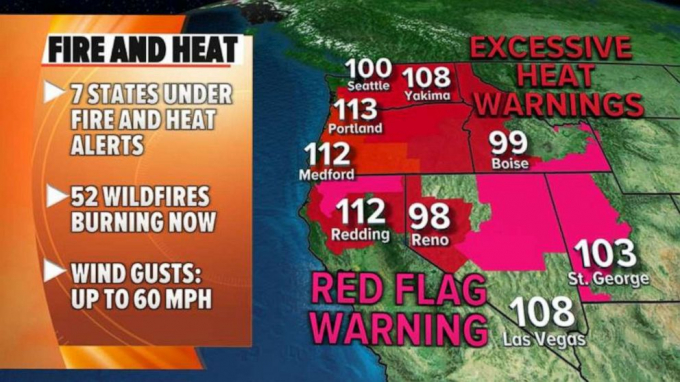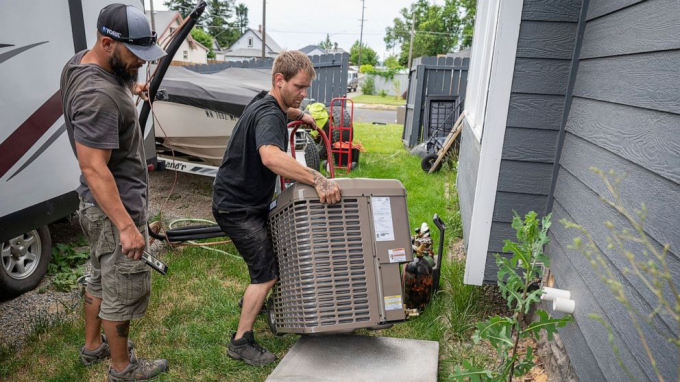May 21, 2025 | 07:59 GMT +7
May 21, 2025 | 07:59 GMT +7
Hotline: 0913.378.918
May 21, 2025 | 07:59 GMT +7
Hotline: 0913.378.918

A historic heat wave is expected to bring scorching temperatures to the Pacific Northwest over the weekend. Photo: ABC
A historic heat wave is headed for the Pacific Northwest, with temperatures expected to surpass all-time records in some regions, threatening the lives of some residents.
Over the weekend, temperatures will be soaring over 100 degrees in major cities like Seattle and Portland, both of which are expecting record highs.
The hottest days will be Saturday, Sunday and into Monday. Portland may top out near 113 on Sunday, while temperatures in Seattle could reach 105 on Monday.
Seattle has only recorded triple digits twice, Karin Bumbaco, the assistant state climatologist for Washington state, told ABC News.
The upcoming heat wave follows several recent record-breaking heat waves that have developed across the Northern Hemisphere due to the upper air flow around the globe, which creates a blocking pattern. When the sun is at a higher angle, it weakens the jet stream, meaning the hot air mass gets even hotter.
This weather pattern is "unusual" for the region, especially considering temperatures aren't expected to decrease at night, a form of relief the West typically can rely on, Larry O'Neill, Oregon's state climatologist, told ABC news. The low temperatures are expected to remain in the mid-70s in Washington and Oregon over the weekend.
"It has been so unusual to see the operational forecast models hold onto these insane temperature forecasts for so many forecast cycles," O'Neill said. "We are fine with it getting hot in the afternoon as long as we get our nightly sea breeze to cool us down to 55 to 60 degrees Fahrenheit, which is usually almost a certainty."
The lack of relief at night could have severe public health implications as people endure prolonged heat stress, O'Neill said.
Heat waves also exacerbate the megadrought that's affected much of the region for decades, leaving even less water to maintain local biodiversity and for agriculture, said O'Neill, adding that a lot of the vegetation in the area is "drought-stressed."

Carl Rocha, left, and Patrick Plummer, with Bills Heating & A/C Install air conditioning and a new furnace at a home on East Wabash Street, June 23, 2021, in Spokane, Wash. With temperatures forecast to hit over 100 degrees by Sunday, a rush of customers are keeping local A/C installers busy. Photo: AP
"There becomes less water available to evaporate, so we can actually get a little bit hotter on top of that, further drying the landscape," he said.
Even if Seattle doesn't reach 100 degrees F, the duration of the upcoming event looks to be longer than other periods of hot weather in the area and that's "concerning for more adverse heat impacts as the heat lingers throughout the region," Bumbaco said.
One concern is that residents in the area, while acclimated to the damp, rainy climate, are not equipped with air conditioning, making any heat wave much more dangerous.
"When there's not relief at night, and people don't have access to air conditioning, then we're gonna see a lot more heat-related illnesses and stress," O'Neill said.
Residents may eventually have to invest in some sort of home-cooling method as heat waves become "more frequent" as global temperatures continue warming, Bumbaco said.
"With increasing frequency of heat waves expected and warmer nights already observed, cooling homes at night will become -- and frankly, already has become -- more difficult without AC," she said.
Heat watches and warnings are currently stretching from California to Washington, bringing attention to underserved populations that do not have the luxury of hiding from the heat.
Intense heat waves also can adversely affect underserved populations, creating for them a "major challenge," Erica Fleishman, director of the Oregon Climate Change Research Institute, told ABC News.
The homeless, agricultural workers, many of whom are undocumented, and other outdoor workers are affected by urban heat islands and lack of access to cool spaces, making it likely that they will feel some of the most intense effects of heat waves, Fleishman said.
(ABC)

(VAN) Attempts to bring down the price of the Japanese staple have had little effect amid a cost-of-living crisis.

(VAN) Fourth most important food crop in peril as Latin America and Caribbean suffer from slow-onset climate disaster.

(VAN) Shifting market dynamics and the noise around new legislation has propelled Trouw Nutrition’s research around early life nutrition in poultry. Today, it continues to be a key area of research.

(VAN) India is concerned about its food security and the livelihoods of its farmers if more US food imports are allowed.

(VAN) FAO's Director-General emphasises the need to work together to transform agrifood systems.

(VAN) Europe is facing its worst outbreak of foot-and-mouth since the start of the century.

(VAN) The central authorities, in early April, released a 10-year plan for rural vitalization.